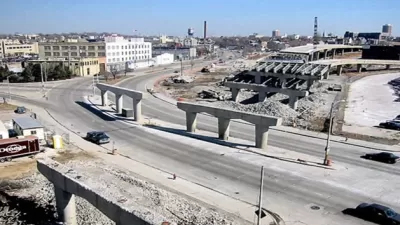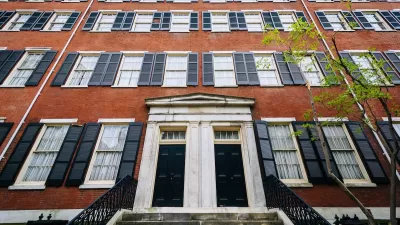The Project for Public Spaces has compiled a "how-to" list for re-claiming your community's public spaces.
Borrowing a page from Fast Company's recent list "7 Ways to Disrupt Your Industry", which focused on various ways that firms can create opportunities for new growth and improved customer service, the nonprofit planning, design and educational organization Project for Public Spaces has released their own list titled "7 Ways to Disrupt Your Public Space", geared towards the reshaping of public areas with people, not design, in mind. "Placemaking" is the mission of this organization, which they see as an inherently disruptive approach that, "tosses out the idea that an architect or planner is more of an expert about how a place should be used than the people who are going to use it."
The simple but informative list is intended for anyone seeking to enhance the social capital or value of spaces in their communities.
One of the tips is to "Dramatically reduce complexity", which affirms the belief that "less is more", in this case in regards to decreasing programmed activities in favor of more spontaneous, natural space sharing.
Another tip on the list is "Make Stupid Places Smart", which encourages the use of Digital Placemaking which, as the organization states, is "the integration of social media into Placemaking practices, which are community-centered, encouraging public participation, collaboration, and transparency."
PPS's list offers easily adaptable and all-inclusive guidelines for creating more sociable and interactive public spaces. As tip number 7, "Make loyalty dramatically easier than disloyalty" states, "When people can meet their needs for socialization and relaxation right in their own neighborhood, they keep coming back, engendering a deeper sense of community as social ties grow stronger..."
FULL STORY: 7 Ways to Disrupt Your Public Space

Alabama: Trump Terminates Settlements for Black Communities Harmed By Raw Sewage
Trump deemed the landmark civil rights agreement “illegal DEI and environmental justice policy.”

Study: Maui’s Plan to Convert Vacation Rentals to Long-Term Housing Could Cause Nearly $1 Billion Economic Loss
The plan would reduce visitor accommodation by 25% resulting in 1,900 jobs lost.

Planetizen Federal Action Tracker
A weekly monitor of how Trump’s orders and actions are impacting planners and planning in America.

Wind Energy on the Rise Despite Federal Policy Reversal
The Trump administration is revoking federal support for renewable energy, but demand for new projects continues unabated.

Passengers Flock to Caltrain After Electrification
The new electric trains are running faster and more reliably, leading to strong ridership growth on the Bay Area rail system.

Texas Churches Rally Behind ‘Yes in God’s Back Yard’ Legislation
Religious leaders want the state to reduce zoning regulations to streamline leasing church-owned land to housing developers.
Urban Design for Planners 1: Software Tools
This six-course series explores essential urban design concepts using open source software and equips planners with the tools they need to participate fully in the urban design process.
Planning for Universal Design
Learn the tools for implementing Universal Design in planning regulations.
Caltrans
Smith Gee Studio
Institute for Housing and Urban Development Studies (IHS)
City of Grandview
Harvard GSD Executive Education
Toledo-Lucas County Plan Commissions
Salt Lake City
NYU Wagner Graduate School of Public Service





























